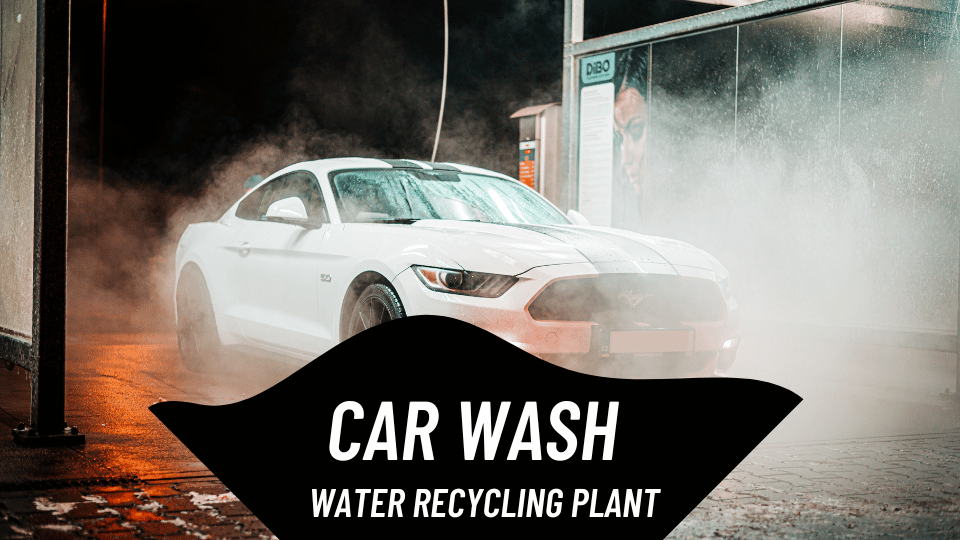How Water Recycling Plants are Revolutionizing the Car Wash Industry
OYF Team Sep 02, 2025 Environment & Sustainability 159

In today's world, where sustainability and environmental conservation are becoming increasingly important, industries are seeking innovative solutions to reduce their ecological footprint. The car wash industry is no exception. Enter water recycling plants, the game-changer in the car wash industry.
Water recycling plants are revolutionizing the way car wash businesses operate by significantly minimizing water usage and reducing pollution. These advanced facilities utilize cutting-edge technology to treat and reuse water, allowing car wash operators to recycle and conserve a substantial amount of water during each wash cycle.
Not only do water recycling plants help businesses lower their expenses by reducing water consumption, but they also play a crucial role in conserving precious natural resources and protecting the environment. By preventing contaminated water from entering rivers and lakes, these plants ensure a cleaner ecosystem for future generations.
With the implementation of water recycling plants, car wash operators are embracing a sustainable approach that aligns with their customers' growing environmental concerns. It's clear that these plants are not only transforming the car wash industry but also setting a new standard for eco-friendly practices.
The Importance of Water Conservation in the Car Wash Industry
Water conservation has become a pressing issue in various industries, and the car wash industry is no exception. Traditional car wash methods, which often involve excessive water usage, contribute to the depletion of water resources and the pollution of natural bodies of water. This unsustainable practice is no longer acceptable in a world striving for environmental preservation.
Car wash businesses have recognized the need for change and are increasingly turning to water recycling plants to address these challenges. By adopting water recycling technology, car wash operators can significantly reduce their water consumption and minimize their impact on the environment. This shift towards water conservation not only benefits the industry but also resonates with environmentally conscious customers who seek out businesses that prioritize sustainability.
How Water Recycling Plants Work
Water recycling plants employ a multi-step process to treat and reuse water used in car wash operations. The process begins with the collection of used water, which is then directed to treatment tanks. These tanks house various filtration systems designed to remove contaminants such as dirt, oil, grease, and chemicals from the water.
Once the initial filtration is complete, the water undergoes further treatment processes, including sedimentation and disinfection. Sedimentation allows solid particles to settle, while disinfection eliminates bacteria and pathogens, making the water safe for reuse.
After treatment, the recycled water is stored in separate tanks, ready for the next wash cycle. Advanced plants often incorporate monitoring systems to ensure recycled water meets industry standards before reuse.
Benefits of Using Water Recycling Plants in Car Wash Businesses
The adoption of water recycling plants in car wash businesses comes with numerous benefits for both operators and the environment. Let's explore some of these advantages:
- Significant Water Conservation: Water recycling plants allow operators to recycle and reuse large volumes of water, reducing reliance on fresh sources and conserving natural resources.
- Cost Savings: Minimizing water consumption lowers water bills and reduces wastewater disposal costs, offering long-term savings.
- Environmental Impact Reduction: Recycling water prevents contaminated wastewater from polluting rivers and lakes, protecting ecosystems and aquatic life.
- Enhanced Reputation: Implementing recycling plants demonstrates environmental responsibility, attracting eco-conscious customers and improving business reputation.
Cost Savings and Environmental Impact of Water Recycling
Cost Savings
Water recycling plants offer substantial cost savings over the long term by reducing both water bills and wastewater disposal expenses.
Environmental Impact
By conserving water resources and reducing wastewater pollution, recycling plants protect ecosystems and ensure the sustainable use of water resources.
Legal Requirements and Regulations
Installing a water recycling plant requires compliance with local environmental, health, and safety regulations. Operators should work with experts to navigate permits and ensure compliance.
Choosing the Right Water Recycling Plant
Key factors to consider include:
- Capacity
- Technology
- Maintenance and Support
- Cost
Maintenance and Troubleshooting
Maintenance
- Inspect and clean filters regularly.
- Maintain chemical levels for effective disinfection.
- Clean tanks and pipes to prevent blockages.
- Calibrate monitoring systems routinely.
- Train staff in proper maintenance.
Troubleshooting
- Fix leaks or water flow issues promptly.
- Address abnormal chemical levels.
- Resolve electrical/mechanical malfunctions.
- Respond to error codes or alarms.
- Engage experts for complex issues.
Aquaprofit-ASC: An Advanced Water Recycling Plant
Lesser Footprint Area
Specially designed for automobile service stations, Aquaprofit-ASC fits in smaller spaces without compromising performance.
Fast and Easy Installation
Prefabricated for quick installation, requiring only two 1000-liter underground tanks.
Easy Maintenance
Minimal daily maintenance with weekly backwashing. Designed for long-term reliability.
Easy Operation
Automatic operation without the need for chemicals or special daily procedures.
Modular Design
Available in 2000, 3000, and 4000 LPD modules, expandable to meet future needs. Learn more at Aquaprofit-ASC or buy online at Water Recycling Plant for Automobile Service Center.
Conclusion: The Future of Water Recycling Plants
Water recycling plants are revolutionizing the car wash industry with sustainable practices that conserve resources, reduce costs, and protect the environment. As technology advances, adoption will grow, making recycling plants a cornerstone of eco-friendly car wash operations.
By investing in water recycling, operators enhance profitability, reputation, and contribute to a cleaner, sustainable future.